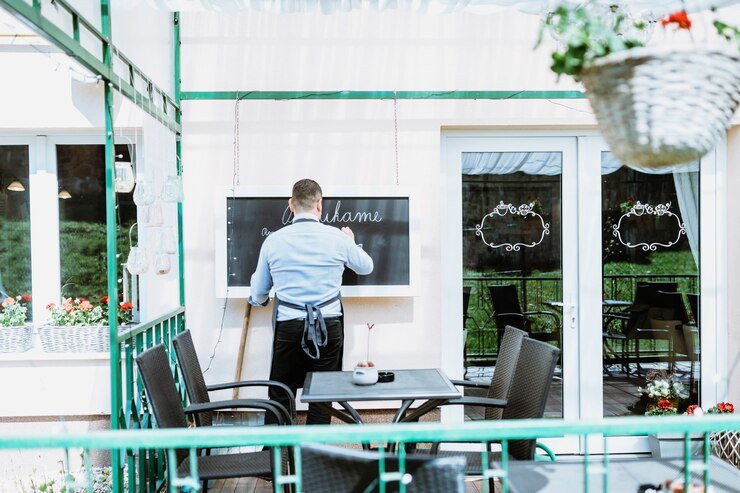Dubai is one of the busiest cities, and its highly diversified food culture opens great avenues for those willing to start a restaurant business. Be it your dream to open your small, cozy cafe, a fashionably modulated lounge, or an authentically ethnic restaurant, there is enough room for every kind of restaurant in Dubai. On the other hand, such ventures demand careful planning, following rules and regulations, and intelligent business decisions.
The blog helps you understand the basics of starting a small restaurant business in Dubai and gives you a competitive edge.
Steps to Open a Small Restaurant Business in Dubai
1. Market Research and Niche Selection
Understand the local food market before plunging into your restaurant venture. Dubai has everything from fine dining facilities to cafes and street food joints. In this highly competitive market, conduct market research and find gaps in either cuisine or dining experience.
Some restaurant concepts to consider include:
- Ethnic cuisine: Authentic ethnic food, whether Indian, Middle Eastern, or Southeast Asian, is in great demand in Dubai.
- Healthy eating: Health-aware dining, whether vegan, gluten-free, or organic.
- Quick service restaurants: Fast-food outlets or take-away services for the city’s fast-moving lifestyle.
- Themed Restaurants/Innovative Dining Concepts: A theme-based or innovative dining concept can also be a hotspot in Dubai’s competitive market.
Picking out the niche will frame the rest of your business plan and marketing strategy.
2. Create a Business Plan
Your restaurant’s success blueprint starts with a business plan. A good plan needs to address, at the very least, the following essentials:
- Concept and theme of the restaurant: clearly define your USP, cuisine, and type of experience for your customers.
- Target market: Identify your key customers.
- Budget and financial plan: Estimate costs such as rent, equipment, licenses, and initial marketing costs. Plot projected revenue, pricing, and break-even analysis.
- Location analysis: Define a strategic location that works for your restaurant concept. High-traffic areas like shopping malls or business districts are great, but they are expensive to rent in.
- Staffing needs: The staff required usually includes chefs, waitstaff, cleaning staff.
Your business plan should also include a marketing strategy showing how to promote your restaurant and attract customers.
3. Funding
Starting a small restaurant in Dubai may be quite an investment when considering the high rent, permits, equipment, and staffing prices. Ensure you are adequately capitalised to cover operational expenses for at least six months up to one year since most restaurants take time to become profitable.
4. Plan the Perfect Location
Location is everything for your restaurant to thrive in Dubai. The city offers various lively hotspots where small restaurants can also flourish. These include:
- Downtown Dubai: Suitable for high-end, fashionable restaurants targeting business professionals and tourists. Downtown is an excellent location for restaurants serving casual food.
- Business Bay: Quickly emerging from almost nothing, combining commercial and residential areas, fast-food restaurants, and cafes.
- Al Karama: With busy streets lined with cheap eateries, it is a perfect location for small ethnic restaurants or casual dining.
When choosing a location, it is essential to consider factors like footfall, competition, and whether your target audience lives or works nearby.
5. Business and License Registration
To operate a restaurant in Dubai, there is a legal process that one needs to go through to get the business registered and obtain a license. Below are the main steps involved in setting up a restaurant in Dubai:
- Choose a trade name: This involves registering the restaurant’s name with the Dubai Department of Economy and Tourism (DET) and ensuring that the name meets the naming criteria.
- Trade license: Then, one must apply for a professional trade license from DET.
- Food safety permit: Approval from the Food Safety Department of Dubai Municipality is required at this stage. It ensures that your restaurant will meet all the health and safety standards.
- Health and safety certificates: The Dubai Municipality will inspect the restaurant to ensure it follows the city’s rules and regulations related to hygiene and safety.
6. Design Your Restaurant and Buy Equipment
A well-planned and designed restaurant to conceptualise your brand will attract more customers. You may want to hire an interior designer who can create an atmosphere related to your restaurant theme, whether casual cafe or fine dining. Emphasise the following:
- Comfortable seating
- Efficient kitchen design
- Welcoming and clean dining area
- Invest in top-quality kitchen equipment, such as ovens, refrigerators, stoves, and small appliances, to keep your kitchen running efficiently.
7. Hiring and Training Employees
People are the lifeblood of a restaurant, so ensuring that you employ well-trained staff is crucial. You will want a team that shares your enthusiasm for outstanding service and fabulous food. The most critical roles to fill are as follows:
- Head chef/cooks: Must be competent with preparing all menu items and proficient at working successfully in a busy kitchen.
- Waiting staff: Must be warm and welcoming, professional, and knowledgeable about the menu items.
- Cleaners: Your restaurant must be clean for food and safety purposes.
8. Promote Your Restaurant
Marketing is one of the most vital aspects of attracting customers, especially considering Dubai’s competitiveness in the food industry. Considerations for promoting your website include, but not limited to:
- Create a website. It should include the menu, address, contact details, and online reservation system.
- Social media marketing: Websites like Instagram, Facebook, and TikTok will be essential for highlighting the menu, events, and promotions.
- Integrate your restaurant into food delivery applications: Once they are listed on applications for delivery like Noon, Talabat, Deliveroo, Careem, etc. their visibility will increase, as will their number of customers.
- Run promotions and offers: Grand opening deals or loyalty programs will help repeat customers.
Building customer loyalty will take time, and your focus should be serving excellent food and services so that reviews and word of mouth remain positive.
Conclusion
A small restaurant business in Dubai is a rewarding venture with a highly diverse food culture and an ever-growing population. From market research to acquiring licenses and marketing, you can systematically plan a successful restaurant with a practical, continuous ability to attract and retain consumers. Remember that there is always room for improvement, ensuring the establishment is regulated according to the law. Choosing the right theme, going with the mainland or free zone, and getting a couple of licenses can be tiresome. This is when Gatestone Group steps in. We help you understand your business needs and incorporate your business smoothly in the competitive market of Dubai so you can thrive.
You can see latest details at: Dirtyship



